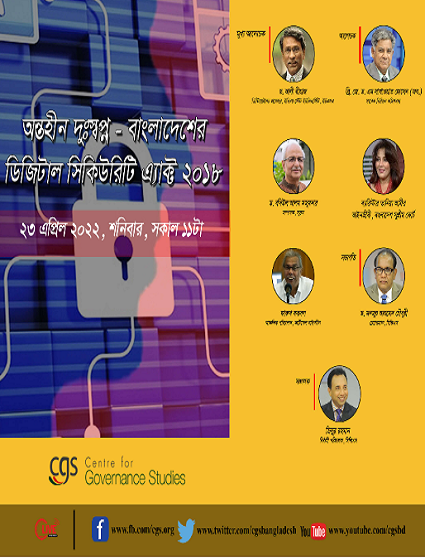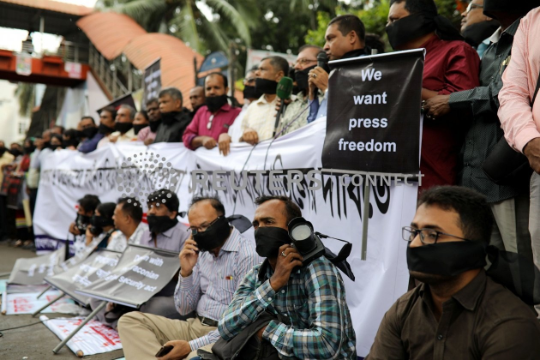Unending Nightmare: Impacts of Bangladesh’s Digital Security Act 2018
Published on 01/05/2022

The Digital Security Act (DSA) 2018, has been the reason behind severe criticism that put Bangladesh in the spotlight from human rights organizations at home and abroad in the past three years. The law has severely disrupted the freedom of expression of journalists and citizens of various walks of society in Bangladesh. Many have been victimized for voicing their opinion online.
On 23 April 2022, during a webinar, Dr. Ali Riaz, Distinguished Professor of Political Science at Illinois State University, USA, and a member of the advisory board of the Centre for Governance Studies (CGS), presented a research report on the Digitial Security Act 2018. The report showed a trajectory where the DSA was increasingly used to silence journalists and opposition politicians. Dr Riaz stated that if such practice continues, a culture of fear and self-censorship will take hold in Bangladesh where people will entirely stop expressing their thoughts and opinions both online and in books and news articles. He made the statement while speaking at the webinar titled “Unending Nightmare: Impacts of Bangladesh’s Digital Security Act 2018”. The webinar was organized by CGS.
According to different media reports, more than 1500 cases have been filed under the DSA from 1 January 2020 to March 2021. 925 cases were filed in 2018, 1189 cases in 2019, and 1128 cases in 2020. CGS has been able to track 890 cases with detailed information from January 2020 to February 2022 and conducted a study where it analyzed the cases.
The presentation of the study was given by the Principle Investigator of the research, Professor Dr Ali Riaz. The discussants of the webinar included Brigadier General (retired) M Sakhawat Hossain, former Election Commissioner of Bangladesh, Dr Badiul Alam Majumdar, Secretary, Citizens for Good Governance (SHUJAN), Barrister Tania Amir, Advocate, Bangladesh Supreme Court, and Faruq Faisel, Regional Director, ARTICLE 19.
The program was presided over by Dr Manjur Ahmed Chowdhury, Chairman of the Centre for Governance Studies and moderated by CGS Executive Director Zillur Rahman
Dr Ali Riaz, in his keynote, highlighted some important statistics from the research conducted by CGS. The most striking highlight of the study is the clear indication of the DSA being used to target Journalists and Political Opponents by members of the ruling party. According to the report, of those accused whose professions are known, 30.98 per cent are politicians, and more than a quarter are journalists. Of the total accused, they constitute 11.32 per cent and 9.22 per cent, respectively. The statistics also show that in a 26-month period, 207 journalists have been accused. Among them, details of about 187 journalists’ media affiliations are known - 70 are associated with national-level media, and 117 are local journalists. Of the 207 journalists, a majority of them are associated with the print media - a total of 92, almost half of the journalists whose workplace has been identified. The second-highest number of journalists are associated with online media - a total of 69. All other relevant statistics regarding the use of the DSA that were discussed in the presentation are available on the website freedominfo.net. CGS will also publish a hard copy of the report in the near future.
Brigadier General (retired) M Sakhawat Hossain stated that the Digital Security Act was created to curb criticism against the government. Such laws exist because the incumbents are aware of the restricted nature of democracy in Bangladesh and therefore wish to avoid questions regarding the method by which they came into power.
Dr Badiul Alam Majumdar stated that in a democratic country, people are born with certain rights as per the constitution and the universal declaration of human rights. These rights include freedom of speech, right to vote, etc. Laws like the DSA are being used to rob citizens of these rights and benefit those who are in power by letting them control online discourse. The DSA was also used before the last election to censor the media from accurate reporting. He concluded that this is a clear weaponisation of the law. Such weaponisation is taking place because the institutions that are meant to safeguard the legal system have been tainted with partisan politics.
Barrister Tania Amir stated there is recent news that there might be a new law which might supplant the DSA. However, this change won’t matter if the substance of the law doesn’t change. We need to decide first as citizens if certain acts, such as expressing an opinion online, can be considered a crime at all. Currently, the subjective decisions of judges are leading to objective instruments of the law. There is a lack of separation between the state and the party in Bangladesh. She raises the question of whether, in such a scenario, can criticize the party amount to criticizing the state? The offense against religious belief laws and blasphemy offense laws are also not clearly defined, and the use of these laws is impeaching freedom of expression. Data is personal property, but it is not recognized as property by the law. Therefore, it is important to see whose data is the data protection laws protecting. She concluded that a substantial debate needs to be had to make sure these laws are not used against the ordinary people in favor of certain special interest groups.
Faruq Faisel stated that according to our analysis by ARTICLE 19, the DSA contradicts multiple international human rights laws and the constitution of Bangladesh itself. Laws need to be made for the people, not to protect certain interest groups. ARTICLE 19 has brought these concerns to the government but has been largely ignored until now. Only recently has there been an indication from the government that there needs to change. The government now agrees that there are instances of misuse of the DSA, but they have not given a solution. Currently, the government has an agenda to try and take total control over social media discourse. He concluded that we must be wary of the level of misuse of the DSA before the upcoming national election.
Dr. Manjur Ahmed Chowdhury concluded the session by stating that the DSA has created a dangerous minefield in the cyberspace of Bangladesh. Various groups can utilize this law to censor and harass ordinary people. It is a sign of our times now that people are thinking twice before writing their opinion in a book or a Facebook post. Freedom of expression is an inherent right of the people ensured in the constitution. Therefore, such a law that undermines fundamental rights cannot exist.




